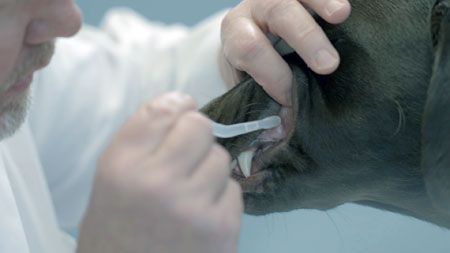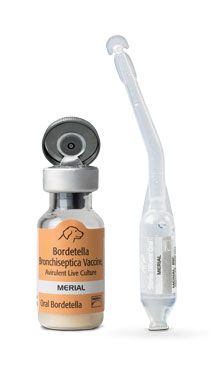New oral Bordetella vaccine from Merial, now Boehringer Ingelheim
One practice owner involved in early trials thinks colleagues "will very much enjoy the intraoral administration ... with less mess, less sneeze, less struggling" with patients.

(Photos courtesy Boehringer Ingelheim)Vaccines for veterinary patients: Some of 'em go in through a needle; some you squirt up the nose. Then there's intraoral delivery, as in the Recombitek Oral Bordetella vaccine from Merial, now part of Boehringer Ingelheim.
The vaccine is administered in a dog's buccal cavity, and Merial says studies suggest it offers dogs a "robust immune response after a single dose."
Frank Capella, co-owner of Village Veterinary Hospital in Canastota, New York, says he liked the results he saw with a blank vaccine using the pipette in more than 20 dogs.

"The pipette worked spectacularly," Dr. Capella says. "As good a delivery system as there is [for vaccines]."
The other alternative to standard vaccine injections has been intranasal delivery, which Dr. Capella says works well enough but can be a little messy. He says intranasal vaccines can require a little more restraint and sometimes result in an incomplete dose-it can be hard to get all the product out in a single squeeze. And, of course, sometimes dogs sneeze.
"If we've been unfortunate enough to do [the intranasal vaccine] in the exam room [with clients]," joked Dr. Capella, "the dog will do that sneezy blowback and half the people in the room end up vaccinated for Bordetella."
Boehringer Ingelheim's own Zach Mills, DVM, executive director of U.S. Pet Vet Veterinary Professional Services, says intraoral delivery could be a better experience: "For many dogs, oral delivery may mean a less stressful experience without the unpleasant sneeze backs of alternative vaccines delivered through the nose. The packaging's flip-top vial cap allows for easy opening by veterinary staff, and the safe, needle-free pipette simplifies the vaccination process while reducing risk of injury."